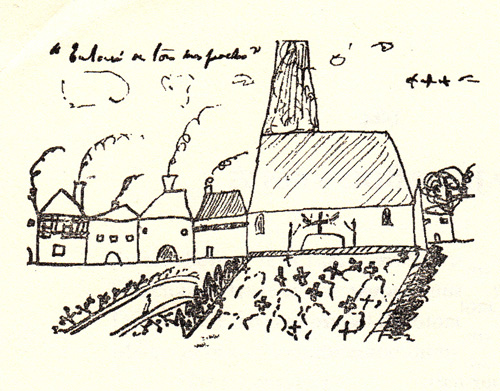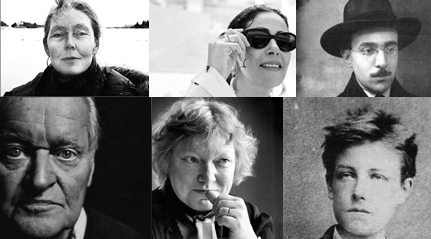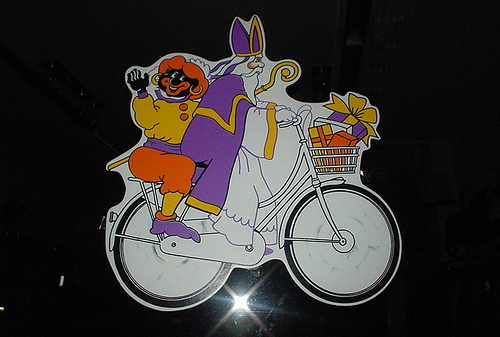“Competitive translating” may sound absurd—but it’s happening (and I wish it had been around in my high school gym class). Translators spar in competitive translation duels put on by London’s Free Word Centre. This week, translators Ollie Brock and Rosalind Harvey went head-to-head with a selection by Mario Vargas Llosa, competing for recognition in a field where invisibility is the supposed ideal. Translation is still scary at Harper’s, where journalist Duncan Murrell muses on misinterpreting his interpreter. (Meanwhile, in case you missed it: our own Aditi Machado thinks hard about translating, bilingual publishing, and reading “across the gutter”). READ MORE…
Monthly Archives: November 2013
Weekly News Roundup, 29th November 2013: Translation Slamming, Million-dollar books, Literary dress-up

A look at some of the most important literary news of the past week
In pop music, much as in fashion, revivals are marked by a unique mixture of ignorance and nostalgia. The sounds and songs of yesterday are only successfully revived when audiences are divided about 50/50 between people who lived through the original era and kids to whom it all sounds fresh and new (if comfortingly familiar somehow). This means that musical genres can be dusted off every 25 years or so—say, when anniversary editions or write-ups appear, or when new artists emerge who’ve immersed themselves in records that are at that point ‘forgotten’ or even derided. 2013, for instance, has seen a newfound interest in two genres that have been mostly dormant since their critical and popular 90s heyday: trip hop, a Bristol-born musical genre clubbed to death by overexposure in coffee shops and boutiques, and (for lack of a better term) ‘indie rock’, and by that I mean the mildly dissonant, charmingly ramshackle, and highly dynamic guitar-based variety as made popular by bands like Pavement and the Breeders, not the more produced and community-oriented music of Death Cab or Arcade Fire. READ MORE…
At a session of the 2013 NCell Nepal Literature Festival, Nepali author Rabi Thapa asked whether small literary magazines still have much of a role to play in the promotion and dissemination of literature, considering they are so difficult to keep afloat. It was, however, somewhat of a rhetorical question, as Thapa himself is the editor of La.Lit, a Kathmandu-based literary magazine launched in January 2013. The word lalit is derived from Sanskrit and used in modern-day Hindi, Nepali, and other languages of the Indian subcontinent to mean finesse, grace, elegance, or beauty. The play on words is clear in English (the ‘Lit’ suggesting literature), but the title has another level of meaning, as Lalitpur, where it is based, is an old kingdom of the Kathmandu Valley that these days is part of the greater Kathmandu urban conglomeration. La.Lit is produced in two forms: on the web and in print, the second volume of which was launched at the Literature Festival. There is some overlap of content in the two formats.
Several weeks ago, I was at a roundtable discussion on editing poetry translations for literary magazines1 at which the question of presenting translations along with their originals resulted in such a range of responses I’ve been unable to let the question go. Unsurprisingly, it was harder for the editors of print journals to accommodate two texts, even if they wanted to: both space and funds are at stake. On the other hand, Don Share, editor of Poetry Magazine, argued that publishing just the translation honors the translator’s work and grants the translation its independence. Erica Mena of Anomalous Press had a different—and to me, fascinating—approach to managing a translation’s independence: not wanting to encourage “reading across the gutter,” the online journal she edits (which you should absolutely visit) publishes the source text in a pop-up window, not en face. “Reading across the gutter,” as I understand it, refers to the sort of reading in which a person compares original and translation word-for-word and line-by-line, checking for “mistakes”—in other words, the sort of reading an en face presentation could unintentionally promote.
Weekly News Roundup, 21st November 2013: Because Internet, Literary Farewells, Punjabi Book Prize

A look at some of the most important literary news this past week
This week reminded us that the Internet coins a gonzo language of its own—and the “real world” should take note. Contrary to Strunk, White, and intuition, “because” seems to be evolving. Grammarians consider the word “because” a subordinating conjunction, but linguists and Internet addicts have noticed another usage: called the “prepositional-because,” this “because-noun” adaptation is 100% flippant Internet wit. In related news, the eponymous spawn of the smartphone, the “selfie,” has won the 2013 Oxford Dictionaries’ Word of the Year. Non-descriptivists, don’t despair (yet): the word has not yet been inserted in Oxford’s dictionaries, though it is being considered for inclusion… READ MORE…
Reading often fools us into feeling like we’re conversing—the words touch our eyes and yet seem to come in through our ears. It is no wonder that people often feel a bond to their favorite writers, their favorite books. They think of them as friends—that first person voice is talking to me, this story was crafted with me in mind. We extract secret meanings: my definition of blue is not the same as yours (I think of a butterfly my mother captured when I was in elementary school); I render Middle Earth far differently than Peter Jackson. Every book is a Choose Your Own Adventure, that way.
DISPATCH: NCell Nepal Literature Festival 2013, Part 2

Asymptote reports on the English sessions at the festival
Though there were more sessions in Nepali than English ones, internationally known writers still made the trip from India (Shobhaa De, Ravinder Singh, Prajwal Parajuly, Prakash Iyer, Abhay K, and Annie Zaidi), Bangladesh (Farah Ghuznavi), and the UK (Ned Beauman) to discuss their work and the work of their peers.
The first English-language session was the launch of the second volume of La.lit, a Kathmandu-based literary journal, begun in 2012. While the first volume included English and Nepali-language fiction, essays, reviews, poetry, interviews and graphic features from Nepal and around the world, the current issue focuses exclusively on writing in English from Nepal. Editor Rabi Thapa (author of the short story collection Nothing to Declare, 2011) stated that when establishing La.lit, one of the rationales for including both English-language and international writing was that he was uncertain that they could gather enough quality Nepali writing. This new volume demonstrates that a platform such as La.lit is necessary for the promotion of a growing body of fiction from Nepal, and fills a niche for local and international readers. Acknowledging Thapa’s efforts as well as the energy of the conference, Prajwal Parajuly said, “This is a very, very exciting time for literature in Nepal.”
Weekly News Roundup, 15th November 2013: Nomads for Proust, Mahmoud Dowlatabadi, translation in India and Korea

A look at some of the most important literary news this past week
New York. You’re hard-pressed to find a French writer who inspires as much nostalgia and anguish as Marcel Proust. In celebration of the 100th anniversary of the publication of À la recherche du temps perdu (known in English as In Search of Lost Time), the New Yorkais rose to the occasion: Ira Glass, Rick Moody, and Paris Review editor Lorin Stein joined forces in a citywide nomadic reading project this November 8-14. Each of the seven reading sessions was illustrated, à la Marcel’s own secret doodlings. (Psst: if you remember Proust’s epic tome as Remembrance of Things Past instead, you’ve got translator Scott Moncrieff to thank).
When you think of the Dutch contributions to pop music, you might find yourself drawing a blank, albeit perhaps one decorated with some tulips, marijuana leaves, and gay marriage. There’s no reason to, really, you only have to listen to the Van Halen boys (who share my hometown, as I recently found out), the fantastic “Radar Love” by Golden Earring, or Morrissey favorites Shocking Blue, a 1960s combo whose songs were made famous by bands as diverse as Bananarama (“Venus”) and Nirvana (“Love Buzz”). READ MORE…
Alejandro Zambra’s “The Novel I Lost”

The Chilean writer reflects on the film adaptation of his novel
Alejandro Zambra is a Chilean writer at the forefront of literature today. The appearance in 2006 of Bonsái, his first novel, was an event—“A bloodletting,” as Marcela Valdes called it. In 2007 he was one of the Hay Festival’s “39 under 39” list of the best young Latin American writers, and in 2010 he was featured in Granta’s Best of Young Spanish Language Novelists issue. He has written two more novels: La vida privada de los arboles (tr. The Private Lives of Trees, Open Letter), and Formas de volver a casa (tr. Ways of Going Home, FSG); his new collection of short stories, Mis documentos, will be out from Anagrama in early 2014.
Editor’s Note: Ever wonder what’s happening literature-wise in Kathmandu? Wonder no more, our editors in Nepal are here to fill you in, and it turns out, there’s no lack of corruption and infighting… This is part 1 of a 2-part dispatch.
The 2013 NCell Nepal Literature Festival started inauspiciously for us, as they say in this part of the world. Arriving at the Nepal Academy in central Kathmandu ten minutes early on the first day, Ross asked in Nepali where the opening ceremony was being held, and we were ushered upstairs into a packed auditorium, where there was a man already speaking. Strange, I thought, as we were early, and things do not generally start on time in Nepal. We clambered into some seats in the middle of a row. Ross began listening to the speaker. “He’s not talking about literature,” he informs me. “He’s talking about the truth.” It dawns on us that we might not be in the right place, so we hope things will wrap up soon and move on to the event we came for. Ross continues to listen. “Oh no, we’re in a Christian convention!” We clamber back out sheepishly, avoiding eye contact. Some better signage from the organisers of the literature festival would’ve been welcome!
Weekly News Roundup, 11th November 2013: Camus, Tagore, and more

A look at some of the most important literary news of the past week
Albert Camus continues to prompt discussion, even in his 100th year. The literary Internet commemorated the passing of Camus’ centenary this week: in The New York Review of Books, Susan Sontag suggests that a literary Camus is “the ideal husband of contemporary letters,” the Irish Times examines the world as Camus saw it, and The New Republic re-releases a review from 1948 in which reviewer Nicola Charomonte posits that Albert Camus’ thinks that life is meaningless. But in Camus’ native Algeria and France? Seems as if the anniversary has passed without much hullabaloo. Tant pis.
A new story by Haruki Murakami was published in the October 28th issue of The New Yorker. The story is called “Samsa in Love” and is translated by Ted Goosen, who often translates Murakami’s Canadian releases. The story concerns someone who wakes up as a man named Gregor Samsa.








